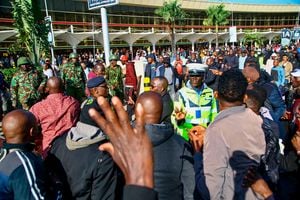Raila’s African Union bid and gender perspective

African Union Commission chairmanship candidate Raila Odinga.
What you need to know:
- The bid brings into focus whether the process of electing the AUC chairperson is gender-sensitive.
- The major provision on this is that if the chair is male, the deputy must be female, and vice versa.
When Raila Odinga launched his bid for election as the next chairperson of the African Union Commission (AUC) on August 27, his eight-point manifesto included promotion of gender equality, alongside economic transformation, intra-Africa trade, financial independence, agricultural transformation, climate action, continental integration, and peace and security. Hopefully, he appreciates that gender permeates all realms and should be mainstreamed in all the other themes.
The bid brings into focus whether the process of electing the AUC chairperson is gender-sensitive. The major provision on this is that if the chair is male, the deputy must be female, and vice versa. This is reflected in the fact that Dr Dr Monique Nsanzabaganwa from Rwanda currently occupies the deputy position to the outgoing chair. It is instructive that she is the first woman to hold this position having assumed it in 2021.
This history suggests that the position had hitherto been held by a man, a pattern also reflected in the fact that the first and so far only woman to be the chair was Dr Dlamini-Zuma from South Africa who was the holder from 2012 to 2017. This works out to 20 per cent of the previous chairpersons. The men who have held the position since 2002 are Amara Essy (acting chairperson) from Ivory Coast (2002–03), Alpha Oumar Konaré from Mali (2003–08), Jean Ping from Gabon (2008–12) and Moussa Faki Mahamat from Chad (2017 to date). Needless to say, no woman was ever the chair of the Organisation of African Unity, the predecessor to the African Union (AU), in its entire history. Not an inspiring history.
That it matters to have a female chair is demonstrated by the achievements of Dlamini-Zuma during her tenure. She foregrounded women’s rights issues in the AU agenda with her pet topic being child marriages and girls’ right to education. She was also instrumental in the development of the AU Agenda 2063 whose goals include gender equality.
The protocols regarding election of the AUC chair stipulates that the Executive Council of Foreign Affairs Ministers managing the process bear in mind the principle of gender parity, alongside other specified factors. Notably also, the six commissioner positions besides that of chair are shared equally between men and women.
It must be pointed out that the commitment to gender balance in the commissioner positions cushions women from the common barriers of patriarchal gender norms that give men precedence in leadership positions, political wheeler-dealing in the continental body and subjugation of the gender equality principle to regional rotation.
Besides gender parity, other key principles to be considered are: equitable regional representation, predictable rotation, talent and merit. In the last regard, capacity for accountable, effective and transparent leadership and management are assessed. Based on the principle of regional rotation, it is now the turn of Eastern Africa to produce the holder from 2025. The three candidates vying are all men, the other two being Mahamoud Ali Youssouf (Djibouti) and Anil Gayan (Mauritius).
This means that women have to wait for the next five years to have a chance of vying, assuming that the incumbent will not be elected for a second and last term. Again, based on regional considerations, read together with gender parity, the northern region is required to propose female candidates for the position of deputy chair. The other three regions (Central, Southern and Western) are eligible to submit at least two candidates (one female and one male) for the six portfolios of commissioners, who constitute the senior leadership with the chair.
A panel of five eminent African personalities, one from each region, oversees the pre-selection process of the chair and commissioners. Commendably, the already listed members include two women, one from Ethiopia and the other from South Africa. The northern region member has yet to be named.
One requirement is that candidates for the chair position must participate in a televised debate broadcasted live to member countries. Advocates of gender equality must look forward to this occasion as a way of gauging what the candidates intend to do about gender equality in Africa if they win the elections. This is a great opportunity for Raila to demonstrate his mastery of and sensitivity to the continental gender issues, but more importantly showcase his vision and strategies to realise it.
As the clock ticks towards the February 2025 elections, gender equality advocates, especially from civil society, should start drafting their agenda to be presented to the next chair upon which his performance will be assessed at the end of the tenure. Indeed, they should develop a scorecard based on his manifesto as well as the AU instruments on gender equality.
The writer is a lecturer in Gender and Development Studies at South Eastern Kenya University ([email protected]).





